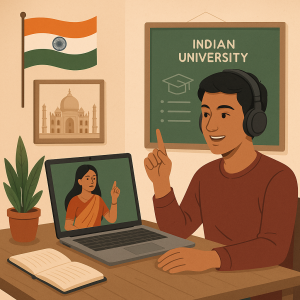
Distance Education is a learning model where students can attend classes without physically being on campus. There’s no requirement to be inside a traditional classroom. You need to register for the course you’re interested in. After that, everything you need—classes, study material, and assessments—will be accessible online. You can even pay your fees digitally and select class timings that suit your schedule.
Over the past ten years, distance education has significantly transformed. In particular, India has emerged as a key player in the distance learning space, launching various academic programs. These programs are open to people worldwide who can register and participate together from different parts of the globe.
Non-Resident Indians (NRIs) or Overseas Indians are individuals of Indian origin or birth who live outside India. These individuals maintain ties with India through nationality, citizenship, or other connections.
In this blog, we will delve into why NRIs increasingly choose Indian distance education programs.
It’s no secret that the cost of higher education is rising, and at the same time, acquiring relevant skills is essential for career opportunities. Skill development and education go hand in hand, and to sharpen those skills, quality education is essential—but it often comes at a high price.
This is where distance learning steps in. It delivers the same quality of education as a traditional on-campus program but at a much lower cost. Indian distance education is especially affordable compared to similar offerings from other countries or full-time programs.
Distance learning involves attending lectures and gaining knowledge through virtual classrooms. Institutions worldwide that offer distance programs have set up the required infrastructure and committees to conduct technical sessions online. In India, all distance education courses are regulated and approved by the Distance Education Bureau (DEB) under the University Grants Commission (UGC).
As per regulations, distance learning in India also follows AICTE guidelines, which ensure that technical and professional education is delivered via a blended or hybrid model. This ensures that learners face no issues while attending online sessions or accessing learning materials.
India is currently ranked second globally in offering distance education. Many young people prefer pursuing their higher education through Indian distance programs. This preference is largely due to the wide range of prestigious institutions that offer these programs. Indian higher education institutions fall into three categories:
State Universities (funded by state governments),
Central Universities (funded by the central government), and
Deemed Universities (renowned for academic excellence and treated on par with other universities).
Together, these universities deliver high-quality distance learning by connecting with students all over the world.
When we think of higher studies, MBA and M.Tech are usually the first options that come to mind. However, distance education includes a much broader spectrum. There are numerous other postgraduate and professional programs offered through distance learning by Indian universities.
Indian institutions now offer various degrees online, covering areas such as science, management, and engineering. Over 13 reputed Indian colleges and universities have introduced online programs like:
- Post Graduate Diploma in Sustainability Science (PGDSS)
- Appreciation Programme on Sustainability Science (APSS)
- Post Graduate Diploma in Food Science and Technology (PGDFT)
- Post-Graduate Diploma in Food Safety and Quality Management (PGDFSQM)
Normally, a student can’t enroll in two academic programs at the same time. But with distance learning in India, you can pursue two programs simultaneously, either from different institutions or by combining one regular course with one online course. Many colleges and institutes now offer online learning programs in India.
You can submit your assignments online whenever it’s convenient for you and attend classes based on your preferred schedule. You’ll also get 24/7 access to the university’s digital library and the ability to take your exams online at a time that works best for you. Moreover, the university staff, professors, and faculty members are just a message or email away whenever you need assistance.